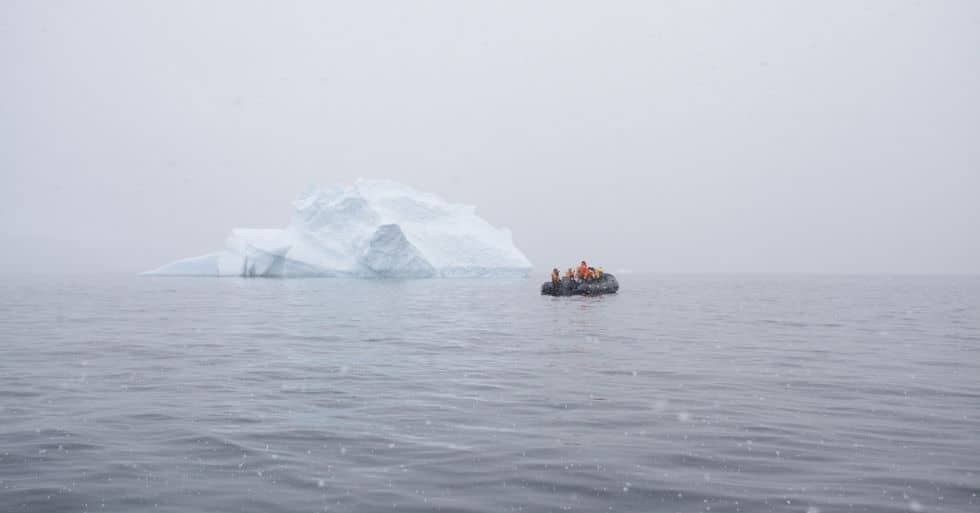Boating in the cold ads on risks that otherwise wouldn’t be there during warm-weather boating. According to weather.com, any water temperature below 70°F should be treated with caution if you don’t have a wet suit. Death to hyperthermia can happen within 30-90 minutes in water 32.5-40°F degrees. Even in water 60-70°F, death can happen in 2-40 hours (source).
So, the 2 most important things you can do when boating in cold weather is to wear a life jacket and make sure your kill switch is connected. A life jacket will keep your head above the water and keep you warm. The killswitch will ensure you don’t get stranded if you fall in.
Some places such as the Washington State coast, never really get warm water temperatures. So, you should always boat with caution in these areas. Although this post is titled cold weather boating, it should be more like cold water boating, as the water is what usually poses the most danger.
Below, I explain 11 tips about boating in the cold that you should know.
1. Wear a dry/wet suit
A wet or dry suit could save your life if you fall into the water, even in relatively warm water. A dry suit could keep you from getting wet if you fall in. This will increase your survival expectancy tenfold if you fall into the water.
However, dry suits are not cheap, and you’ll need to drop at least $400 to get one. Here is a link to a relatively cheap one on Amazon I found. I especially recommend getting a dry suit if you plan on boating in any water temperatures below 50°F.
If you don’t have the money for a dry suit, you can find wet suites such as this one for much cheaper. Wet suits won’t be nearly as good as dry suites at keeping you warm and dry, but they will significantly increase your ability to be in cold water.
2. Wear a life jacket
Pairing a life jacket with a dry suit is the safest thing you can do when boating in cold weather. The drysuit will keep you dry and warm, and the life jacket will keep your head out of the water in case you pass out.
Not only that, a bright-colored lifejacket will help search and rescue find you in case of an emergency.
3. Keep your kill switch connected
The absolute worst thing that can happen when boating in cold weather is for you to fall out of your boat and not be able to get back into it. So, it’s extremely important to wear your kill switch, especially for speed boats and bass boats, where falling off is more likely.
4. Carry a VHF radio and an EPIRB
A VHF radio allows instant communication from you to other boats, marinas, bridges, and the Coast Gaurd (source). So if you were to get into trouble, it would be easy to get help even if you don’t have phone service.
An EPIRB (Emergency Position Indicating Radio Beacon) helps search and rescue find you in case of an emergency. If the water is cold, there is very limited time to get saved, so this will help cut down that time in case of an emergency.
5. Make sure you have working flairs
Flairs are another emergency visual signal you can use to get help quickly. However, many people don’t realize that flairs expire and need to be replaced once every 3 years.
6. Don’t captain when drunk
If your blood alcohol concentration is higher than the legal limit in your state, it is illegal to operate a boat. Along with that, if an emergency were to happen, you may not make correct decisions when drunk. So to avoid this, the captain should only ever have a couple of drinks max when going out on the boat.
7. Leave your word when going out
Make sure someone knows if you’re going out boating (especially on a large body of water). You should tell them what time to expect you back and when they should call emergency services if you don’t come back. If an emergency were to happen, a cold night cold kill you from hyperthermia even if you have a lot of layers.
8. Bring extra layers
Always wear a jacket if it’s cold, but you should also bring extra blankets and clothes in case the temperature drops or an emergency happens that makes you stay on your boat overnight. Along with that, if you were to fall in the water, extra dry clothes could save your life.
- What Is The Cheapest Way To Store A Boat? - February 28, 2023
- Do Boats Need Bottom Paint? (Uncovering the Truth) - February 2, 2023
- How Much Is Bass Boat Insurance? (Real Quotes) - January 18, 2023

